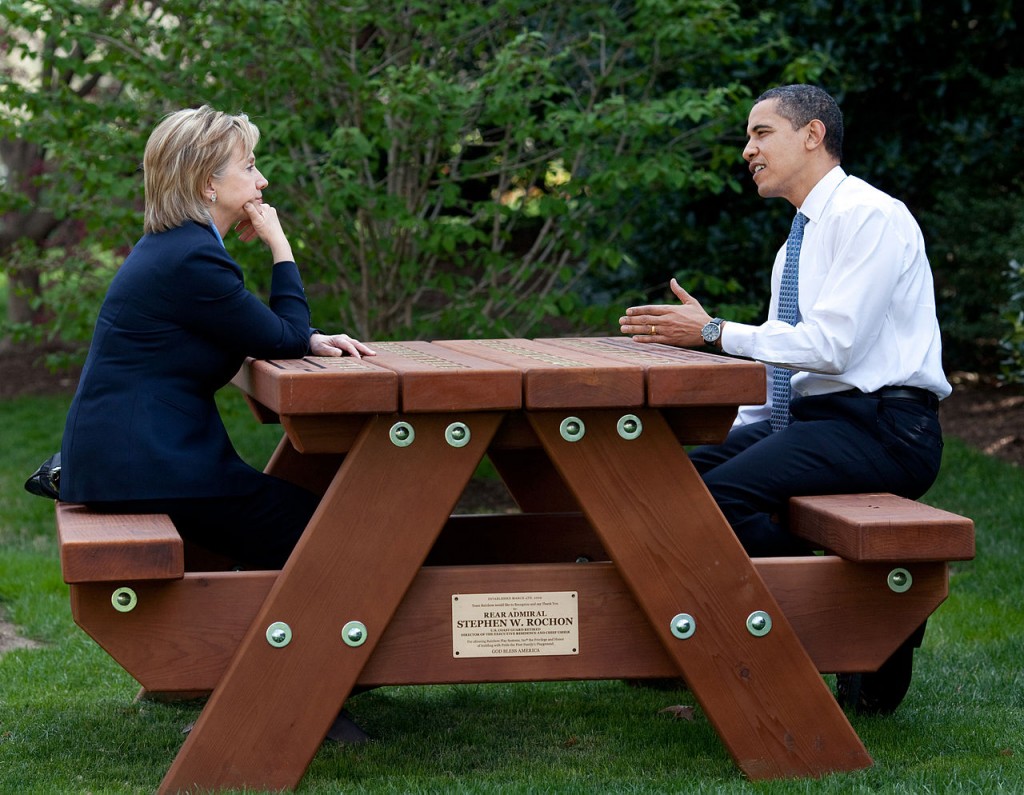How the party of FDR and JFK deals with the Iran agreement will determine its credibility on foreign policy for decades to come.
Two of the most powerful members of the Democratic Party, former and current senators from New York, now hold the fate of the putative deal with Iran in their hands. Because they alone can overturn it, this means that presumptive presidential nominee Hillary Clinton and presumptive Senate Minority Leader Charles Schumer carry a heavy burden that will deeply affect their personal reputations and, most probably, the trustworthiness of the Democrats in foreign policy for at least a generation.
Their former senatorial colleagues Barack Obama, Joe Biden and John Kerry already own their decision, though their logic still remains unclear to both the most diligent and the most casual observer. The president asserts that his piece of paper will prevent Iran from getting nuclear weapons, presuming both the honesty of a regime that has displayed mendacity and hostility for 35 years as well as the existence of a wide-ranging verification capability that his own agreement has fatally compromised. And then, of course, there is the sunset provision that enables Iran to acquire nuclear weapons anyway. As they congratulate themselves on the hard work that produced this bizarre document—Bloomberg News related that “[a]ll present were in a kind of awe”—have these former Solons stopped to wonder why Iran negotiated in the first place when their leaders still insist on claiming they don’t want nuclear weapons? The entire process is built on lies. If the Iranians didn’t want nukes, then why would they want a time limit?
Of course the Iranians are dissimulating—they want the funds that come from sanctions relief, the legitimacy that comes from press conferences with great powers in central Europe, and, finally, an eased path to nuclear weapons. They have managed to achieve all three, without having to pause their “Death to America” street rallies, return their American hostages, curb their aggression in the Middle East, or release their defrauded presidential candidates from house arrest. (Nor has the U.S. President seen fit to even mention these ongoing depredations.) On the U.S. side, the assertion is that Iran will modify its irredentist behavior, even as its last demand (to which Obama and Kerry shamefully caved) was to lift the arms and ballistic missile embargos. Not exactly evidence-based decision-making when you consider the Ayatollah Khamenei’s comment just this weekend: “Our policies toward the arrogant government of the United States will not be changed at all.”
Diplomats may be sent abroad to lie for their country, according to the saying, but they ought to be honest at least with themselves. Honesty is the most obvious ingredient missing in the aftermath of the agreement. The Administration’s apparent thinking, if that is not too dignified a term, is that Iran as a Persian Shi’ite power can serve as a counterweight to the Arab Sunni majority in the Middle East. The White House has occasionally let slip that former professor Obama has “gone to school” on the concept of balance of power. But what a weird way he has of balancing.
Consider the last six years of our President’s policies. Having supported the majority Shi’ite population in Iraq and strengthened Iranian influence there, he proceeded to avoid supporting the majority Sunni population in Syria, thereby strengthening Iranian influence there too. We also declined to leave even a modest troop presence in Iraq on the fatuous premise that we would thus “end the war.” On top of all of this, and emblematic of the lack of principle in our president’s vaporous philosophy of “change,” was his willingness to allow the famous Syrian red line against the use of chemical weapons to be casually crossed.

Taken together, these decisions produced a vacuum that has led to the rise of ISIS, fueled by a combination of grievance toward the mullahs and their Syrian and Iraqi proxies as well as American incompetence and indifference. This result was not only foreseeable but was foreseen: Hillary Clinton was eager to admit in her most recent memoir that she wanted to do more for the Syrian opposition.
Whatever else the U.S. has done in the Middle East under Obama, it has certainly not balanced any power. We have not required nor even apparently requested any change of Iranian behavior in the region, so the mullahs and their gunmen continue energetically disrupting the status quo, from Yemen to Lebanon, from Gaza to Bahrain. And predictably, as Iranian efforts expand, ISIS grows stronger. Perhaps the president shares the excitement of this disruptive revolutionary moment, but it clearly has nothing to do with the protection of American interests or the improvement of life for the average Sunni or Shi’a Muslim.
This dissonance between Administration aims and the facts on the ground has reached its nadir in the negotiations with Iran. Strangely, the President and the Secretary of State wanted to separate the issue of the nature and conduct of the Iranian regime from the nuclear issue. Most would think that a negotiation over the details of uranium enrichment would take into account the behavior of those who will control the uranium once it is enriched. And that the government of the United States, which provides hundreds of billions in sanctions relief, might also want to consider how that money would be spent. The Iranians certainly recognized these two issues as linked, and used that linkage to their advantage, insisting, with Russia’s predictable help, on the easing of the arms embargo. (No surprise there: The Russians are delighted to constrain American power and undermine American interests.) This was the capstone achievement of our team’s incompetent approach: The U.S. excluded nonnuclear issues that conduced to our interests in order to get a deal, while Iran then included nonnuclear issues to their benefit because the U.S. wanted to get a deal. Obama calls this “negotiating from strength.”
To see how confused and even absurd the Democratic approach has been to Iran, consider the case of Korea. Does anyone think that if Obama withdrew the 30,000-odd U.S. troops in South Korea that he would “end the war”? On Obama’s logic, we should be exiting our troops immediately and freeing up hundreds of billions of dollars of funds over the next decade for North Korea, while enabling a sponsor like China to sell them conventional arms and ballistic missile technology. Then we can sit back and “hope” that North Korea will “change.”
Two decades ago, the North Koreans challenged the administration of our last Democratic president in the same way as Iran challenges our current one. Who can forget The New York Times’s editorial judgment in 1993 that “President Clinton is adopting a sound diplomatic strategy for coaxing North Korea to give up its nuclear ambitions” by “rightly resisting pressure to get tough with Pyongyang”? This month, one day after the Ayatollah said emphatically the deal will not change his country’s attitude toward the U.S., the Times asserts that President Obama “was right to keep the focus on restraining” the Iran nuclear program, but that if the sanctions are not lifted quickly enough, the so-called Iranian “moderates” could be discredited, “boosting the hard-liners.” Cognitive dissonance seems to be the official editorial policy of the Democratic elite.
The obvious point is that the nature of the Iranian regime matters, just as the nature of the North Korean regime matters. While our leaders take a holiday from history, the bad actors of the world do not take much of a vacation. American voters know this, which is likely why Obama did not disclose his detailed intentions regarding Iran in his 2012 re-election campaign. But now many Democrats complain that supporting the deal is their only choice. Moreover, the president, this time through the agency of his UN ambassador, the putative idealist Samantha Power, has laid a procedural trap for the wavering Democrats by introducing the big power treaty to the Security Council where it has already passed. This will make congressional review doubly difficult, and more than doubly important. In any case, the compact deserves negation on its own terms. But, as it happens, the Ayatollah who truly runs Iran declared on the morrow of the announcement of the agreement his intention to wage war. On Israel, no surprise. And on us, the U.S., the very architect of this peace.
Obama the star negotiator has told us that the only other alternative to this treaty is to resolve the Iranian issue “through force, through war.” But, of course, there are other alternatives to war than deficient deals that damage our interests. Fortunately, America is full of talented, responsible, creative negotiators who can improve on the woefully low bar set by Obama, Biden, and Kerry in this catastrophic bargaining process. There is no reason Senator Schumer, with Secretary Clinton’s backing, cannot lead a consensus in Congress to tie a set of focused, reasonable conditions to their support for the existing deal. Since Iran was happy to trade and re-trade right up to the negotiators’ self-imposed deadline, and then extend the deadline, there is no reason Congress cannot exercise its constitutional prerogative and send the administration back to the table with some improvements. For starters: Cancel the automatic removal of the conventional arms embargo in five years and the ballistic-missile ban in eight years and link them to a future vote in Congress, which will depend crucially on concrete Iranian behavior; release immediately all American hostages held in Iran; insist that Iran come clean immediately about prior illegal military nuclear activities; and enhance the verification procedure to ensure quick inspector access to any suspect Iranian site upon demand within a week. If those four conditions are incorporated in the deal, the U.S. Congress will then lift American sanctions.

Sen. Charles Schumer, D-N.Y.,Photo: (NASA/Bill Ingalls)
Obama and Kerry will naturally protest, as will the allies, that we are re-opening the so-called agreement. The “awe” reported by Bloomberg might dissipate. But Iran happily reneged upon the April agreement, so why do Americans and the Democratic Party have to be shackled permanently to a poorly conceived and weakly negotiated deal? The outcome will be imperfect. You could anticipate a situation where the Europeans lift sanctions and the U.S. does not. Such are the consequences of incompetence. But U.S. sanctions do matter, and their continuation (in the absence of reasonable satisfaction of congressional conditions) will affect Iranian calculations. Moreover, the uncertainty created in the Iranian leadership will restore some leverage to the next American president. If Schumer and Clinton instead passively capitulate to the flawed approach of the administration, they will bear their full share of responsibility for the substance of the deal and the consequences for their party.
About this matter of political consequences: has the Democratic Party forgotten the McGovernite legacy from which it fought for so long, and for a time so successfully, to free itself? The George W. Bush Administration’s post-invasion missteps in Iraq, and their grisly consequences, have given the Democrats a dangerous sense of their own freedom: Americans may oppose aggression without strategy, but history has shown that they also oppose idealism without strength and pragmatism without principle.
Our current president flatters himself with comparisons to Abraham Lincoln. But Lincoln knew about confronting adversarial regimes possessed of corrupt, intolerant and militant principles. Even as he worried about losing his re-election bid 151 years ago this summer to New York Democrat Gen. George B. McClellan, who advocated a quick peace with the South and an end to emancipation, he sent Gen. Philip Sheridan to destroy the economic infrastructure of the Shenandoah Valley and Gen. William Tecumseh Sherman to do the same in Georgia. Lincoln understood that there are some illegitimate regimes that demand resistance rather than compromise.
![]()
Banner Photo: Isthmus / Wikimedia





